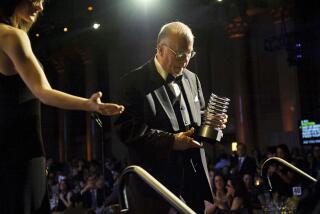Stephen A. Benton, 61; Invented the Holograms Used on Credit Cards
- Share via
BOSTON — Stephen A. Benton, a Massachusetts Institute of Technology professor who invented the rainbow-colored 3-D holograms widely used on credit cards and driver’s licenses to thwart counterfeiters, has died. He was 61.
Benton, who directed the MIT Center for Advanced Visual Studies and was a founding member of MIT’s Media Laboratory, died Sunday of brain cancer at Massachusetts General Hospital.
“The significant thing is that the majority of holograms that have been reproduced or made are Benton’s holograms,” said Steven L. Smith, Benton’s lab manager. “It truly brings holograms out of being a lab curiosity into being something in the real world.”
Benton was working at Polaroid Corp. when he invented white-light transmission holography, or the rainbow hologram, in 1968. Holography records light wave patterns on film or glass with images that appear to be three-dimensional.
Viewing of earlier holograms required special lighting or lasers. “Benton holograms,” as rainbow holograms came to be known, were easily visible to the naked eye.
Benton holograms are embedded in credit cards and driver’s licenses during manufacturing in a process that is difficult for counterfeiters to duplicate.
Benton was born in San Francisco and grew up in Santa Barbara. He became an optics enthusiast at the age of 11 after wearing 3-D glasses for the 1953 Vincent Price thriller “House of Wax.”
“There was a realism and a sense of excitement like nothing I had ever felt before. Not only was I amazed; I determined then and there to figure out how it worked,” Benton told an MIT publication in 1999.
He received his undergraduate degree from MIT in electrical engineering and earned a master’s degree and a doctorate from Harvard.
He held 14 patents in optical physics, photography and holography, and his works in holography have been displayed at the Museum of Holography in New York.
His research has also been used to create three-dimensional images for medical diagnoses.
Benton, a longtime resident of Lincoln, Mass., is survived by his wife, Jeanne Lamphier Benton, a daughter, a son and two brothers.





